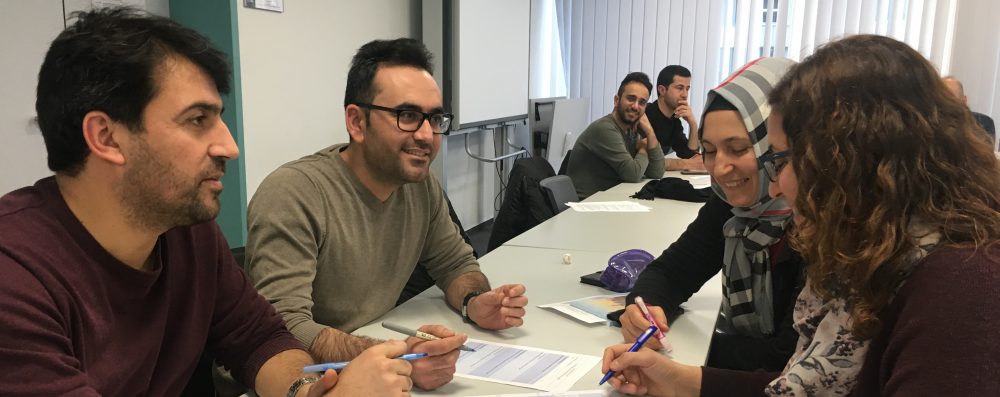The basic perspective framing the (research) activities in the project is the involvement of the (recently) immigrated and refugee teachers as well as other stakeholders into the process of the development of a transnational perspective on re-qualification of (recently) immigrated and refugee teachers. Their feedback will also shape the development of tools to inform about and further process of integration into the job market, one of the main goals of the project.
Theoretical overview
Participatory research has been commonly used in social sciences since the 1970’s. It was established as a critical reaction to the predominant empirical-analytical and quantitative methods of scientific practice up to that time. It has a long history in health research (Cornwall/Jewkes 1995) and disability studies (Nind/Vinha 2014) and lately also in research with refugees (Ellis et al. 2007). According to Brydon-Miller (1997, 657), the participatory approach “refers both to research practices that create social change and, in the process, transform those participating in the research as well as to a fundamental transformation of the field”. Key for participative research is to explore and further on study the topic with experts in the field, (e.g. refugee teachers). As opposite to doing research without involving them and consequently promoting empowerment by co-creating the (research) environment. Adopting a participatory research process, we want to make sure that instead of reproducing colonial, hegemonic power structures by implementing research about subjects, we do research with participants as experts on themselves – which in the same way needs to be critically reflected according to a postcolonial perspective (Castro Varela 2015; Mecheril/Rose 2012).
According to that, participatory research does not have a standard methodology or a unified method. Existing literature to participatory research describes an enrichment in perspectives and a convenient way to build a bridge between practical experience and research (von Unger 2017). Due to the quality of closing gaps between theory and life praxis as well as different institutions and people, participatory research requires flexibility and an open mind set.
References:
Brydon-Miller, M. (1997). Participatory Action Research: Psychology and Social Change. In: Journal of Social Issues, Vol. 53, No. 4, 657-666.
Castro Varela, M. (2015). Postkoloniale Theorie. Eine kritische Einführung. Bielefeld: Transcript
Cornwall, A., Jewkes, R. (1995). What is participatory research? Social science & medicine. Vol. 41, No. 12, 1667-1676.
Mecheril, P., Rose N. (2012). Qualitative Migrationsforschung – Standortbestimmungen zwischen Politik, Reflexion und (Selbst-)Kritik. In: Ackermann, F. et al. (ed.): Qualitatives Forschen in der Erziehungswis-senschaft. Springer VS: Wiesbaden, 115-134.
Nind, M., Vinha, H. (2014). Doing research inclusively: bridges to multiple possibilities in inclusive research. British Journal of Learning Disabilities, 42(2), 102-109.
Von Unger, H. (2014) Partizipative Forschung. Einführung in die Forschungspraxis. Springer VS: Wiesbaden
